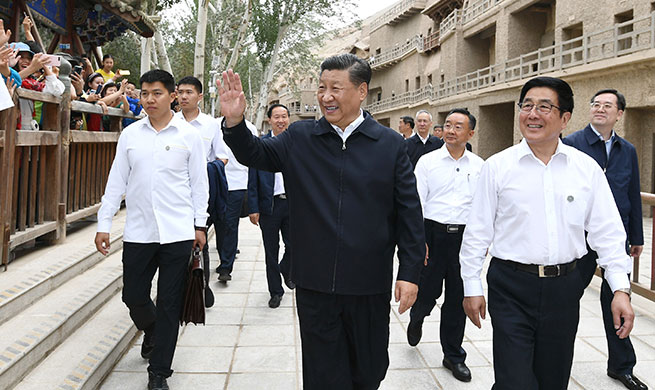ROME, Aug. 19 (Xinhua) -- The euro currency has steadily lost value against U.S. dollar and other major currencies over the last year, but the trend that could normally work in favor of Italy and other major European exporters is being neutralized by other factors, warned economists.
A variety of factors have combined to weigh down the value of the currency used by 19 European countries including a continent-wide economic slowdown, historically low interest rates from the European Central Bank, and uncertainty created by the widespread rise of nationalism across the continent.
Political and economic instability in Italy, the third-largest economy in the euro currency zone, is also a major factor in the euro's decline, according to Hildebrandt and Ferrar chief economist Javier Noriega.
Over the last year, the euro has gone from a high of 1.20 euros per dollar, most recently in September 2018, to a low of 1.10 euros per dollar last week. That is a loss of nearly 10 percent.
"Italy has repeatedly clashed with the European Commission and created worries the country might eventually default on debt payments or move towards leaving the eurozone," Noriega told Xinhua. "Add to that Italy has consistently seen less economic growth than the euro zone average."
Noriega and other analysts said that the weak euro could actually help Italy and other eurozone countries that depend heavily on exports by making their products less expensive in countries that do not use the euro.
"One way to look at it is that all things being equal products made in the eurozone are 10 percent cheaper than they were a year ago from the perspective of countries using other currencies," Noriega said. "The trouble is, all things are not being equal."
One major factor offsetting any potential gains is the array of tariffs put in place by the United States, a major importer of European goods. Because of those tariffs, the majority of goods produced in Italy and elsewhere in the eurozone and sold in the United States are actually more expensive for consumers than they were a year ago.
There is also an escalating tension between the United States and China adding further volatility to the global economy.
Another big factor, according to Spanish economist and author Carlos Diaz Riva, is that other important currencies have lost value against the dollar, offsetting the trend for the euro. The British pound, for example, has weakened due to uncertainty related to the country's planned exit from the European Union. The Chinese yuan has also weakened against the U.S. dollar.
While the United States is Italy's largest trading partner outside the 19-nation eurozone when combining imports and exports, China is second and the United Kingdom is third.
"There was a time when a weakening currency would have been a help to major European exporters like Germany, Italy, or France," Diaz Riva said in an interview. "But today the global economy is too volatile. A weaker euro is just one of a wide array of factors."













